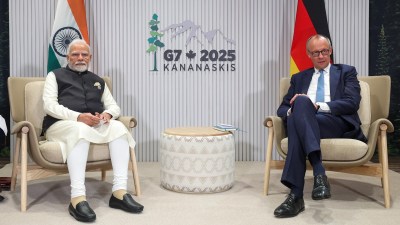Pieces of a Shia jigsaw
Reporting the bomb blasts in Karbala and Baghdad, The Guardian, London, said: 8220;The attacks were aimed at Shia pilgrims celebrating the ...

Reporting the bomb blasts in Karbala and Baghdad, The Guardian, London, said: 8220;The attacks were aimed at Shia pilgrims celebrating the festival of Ashura.8221; The phrase 8220;celebrating the festival8221; betrays ignorance of Ashura, Muharram, Shias, Iraq and, possibly, the Muslim world.
I would not expect a vast majority of people in the non-Muslim world to be conversant with fine points about Ashura, Muharram and the tragedy of Karbala, but reporters of major newspapers and TV stations posted to Baghdad would be expected to have done some elementary reading about Shiaism and the Shia world. After all the sect constitutes 65 per cent of Iraq8217;s population.
No, Muharram is not 8220;celebrated8221; but very solemnly observed. Ashura is the tenth day of Muharram, climax to the tragedy of Karbala. It is not a festival, but a period of mourning. It was on this day that the Prophet8217;s second grandson, Imam Hussain, and 72 relatives and friends were martyred at the hands of vast armies in the epic battle of Karbala.
I have picked on The Guardian at random. It is not the only culprit. Internationally known TV anchors were reporting 8220;festivals8221; and 8220;celebrations8221; cut short by the bombers.
The coverage of the bombings has raised other questions too. For instance, Paul Wood of the BBC, in flak jacket, was on the terrace of a building near Imam Hussain8217;s shrine in Karbala. His camera picked up the first explosion, which occurred in the middle of a crowded avenue leading to the shrine. Was this a combination of professional good luck and shrewd anticipation on the part of the cameraman? Shocking that Paul Bremer in Baghdad could not anticipate the trouble being commonly discussed by journalists in Iraq.
Everybody in the Shia-Muslim world knew that the 10 days of Muharram from February 23 to March 2 would attract unprecedented crowds to Karbala not only from the Shia dominated areas of Iraq but from neighbouring countries as well. It was common knowledge that it would be an emotionally charged crowd. After all, this would be the first open, public demonstration of grief, at Imam Hussain8217;s martyrdom 1,400 years ago, since the coming of the Baathists in Baghdad and particularly after Saddam Hussain harshly quelled a Shia uprising in 1992. The damage to the shrines of Imam Hussain and his half-brother, Hazrat Abbas, in the course of Baathist attempts to flush out Shia rebels was a tightly kept secret of the Saddam regime. Doordarshan was the only network in the world to have shown that footage.
An efficient administration in Baghdad would have been alert to the most important date on the Shia calendar. The message to the Muslim-Shia world would have been of Americans showing a semblance of control. But they have botched it like so much else since they embarked on their ill-planned post-9/11 War on Terror, a 8220;pre-emptive8221; invasion included.
The impression now is that 8220;the Americans have got away with murder so far and will get away with this one as well8221;, in the words of an Arab editor. In this callous momentum of might-is-right they will brazenly cut loose after June 30, leave 120,000 troops in secure cantonments and advertise it as the transfer of sovereignty to Iraqis. This is the buzz I pick up from Arabs who, ironically, are doing business with the US. Frightening, this global friendlessness of the Americans of which they will be the last ones to know.
The Grand Ayatullah Ali Sistani of Najaf has squarely blamed the Americans for indifferent security arrangements along Iraq8217;s borders. Which border is he hinting at? Surely not the Iranian border, because Iran8217;s Shias would never disrupt Ashura. The Saudi border because the Wahabis are unsettled with the rise of Shia identity next door? Could it have been Baathist elements out to scuttle an observance which would have underscored the Shias8217; freedom of worship under American auspices?
The unquestioning acceptance by the networks of the line put out by the occupying forces in Baghdad that Al-Qaeda was behind the attacks is quite astonishing. Al-Qaeda8217;s declared aim is to put pressure on the Americans. Why would it stir up a diversionary Shia-Sunni side show which would release direct pressure on the Americans? There has been considerable focus on the Shia world in recent weeks. Ariel Sharon, who would not swap prisoners with Palestinians, released hundreds of prisoners in a deal with Hasan Nasrallah of Hizbullah in Lebanon. The clergy in Iran has retarded the progress of the reformists. The Shia identity within Iraq is consolidating itself.
Attacks on Shias in Pakistan have their genesis in the days when the US, Pakistan and Saudi Arabia encouraged the Mujahideen and Taliban in Afghanistan with the twin aims of combating the Soviets and creating a Wahabized bulwark against the Shia revolution in Iran. It is the latter project which fed the Shia-Sunni divide in Pakistan. It is a brief history with straightforward linkages extending up to Iraq which journalists covering the story would be expected to know. Muharram 8220;celebrations8221; and 8220;festivals8221; are astonishing.
- 01
- 02
- 03
- 04
- 05






























